Coin Values Moving with Precious Metals: Up-Dated 2/9/2026: Gold $5024 | Silver $81.82
1943 Penny Value
1943 penny value reflects its unique status within the Wheat cent series. A standard method is used to located how much its worth on the chart. Collectors are interested in a few main factors to any coin: Date | Mint Mark | Condition
Date and mint mark collecting are a main focus to collections. Each combination is valued and listed on the chart.
Also important to collectors is condition of a coin. Grading condition is guided by standards. A better than average 1943 cent stands out over lesser condition coins. Values climb with these upper grades.
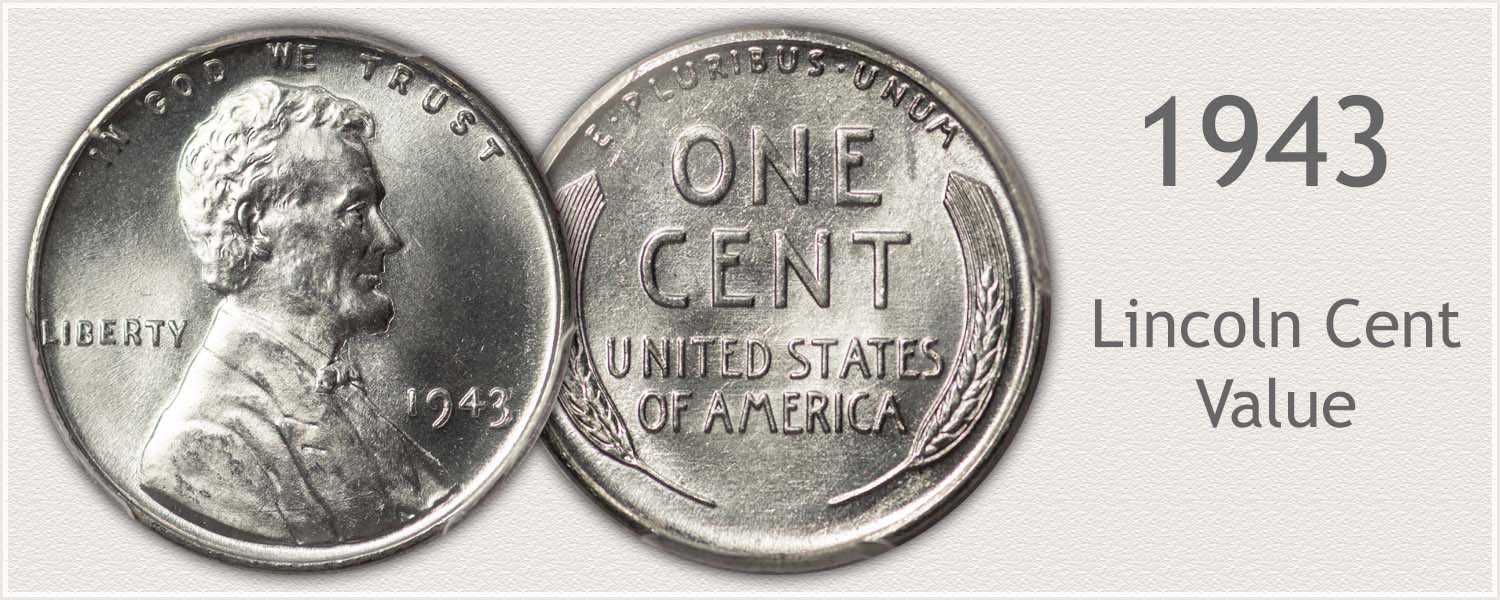
Steps Leading to Value:
- Step 1: Date and Mintmark Variety – Identify each date and its mintmark variety.
- Step 2: Grading Condition – Judge condition to determine grade.
- Step 3: Special Qualities – Certain elements either enhance or detract from value.
| 1943 Lincoln Penny Value | ||||
|---|---|---|---|---|
| Condition of Coin | ||||
| Date | Good | Fine | Extremely Fine | Uncirculated |
| 1943 Lincoln Penny Value Up-Dated | 2026 | |||
| 1943 Zinc | $0.13 | $0.30 | $0.43 | $2.02 |
| 1943 D Zinc | $0.15 | $0.40 | $0.70 | $3.30 |
| 1943 S Zinc | $0.35 | $0.55 | $0.88 | $5.60 |
Placing an accurate value on your 1943 penny follows a step by step process. Step one is to confirm exact Date and Mint Mark variety. Images used to locate mint marks finds its exact place on the chart.
Second step, is an appraisal of condition. Matching your coin to grading images gives a good indication of its condition. It is important to judge your coin against both the images and descriptions. Metal alloy of 1943 cents has a few considerations effecting its market acceptance.
Identity of Date and Mint Mark begins the process.
Step 1: | Date and Mintmark Combination
Identify Listing of 1943 Varieties
Unique in US mint history, three varieties of these 1943 cents were struck. Interest remains high along with demand. A composition of steel, coated with zinc, resulting in their distinctive color, sets these coins apart. Production was large 8th highest in the wheat series, 1,093,838,670 totals; when combining all mints.
1943 Lincoln Penny
No Mintmark Under Date: Philadelphia Mint Struck the Coin
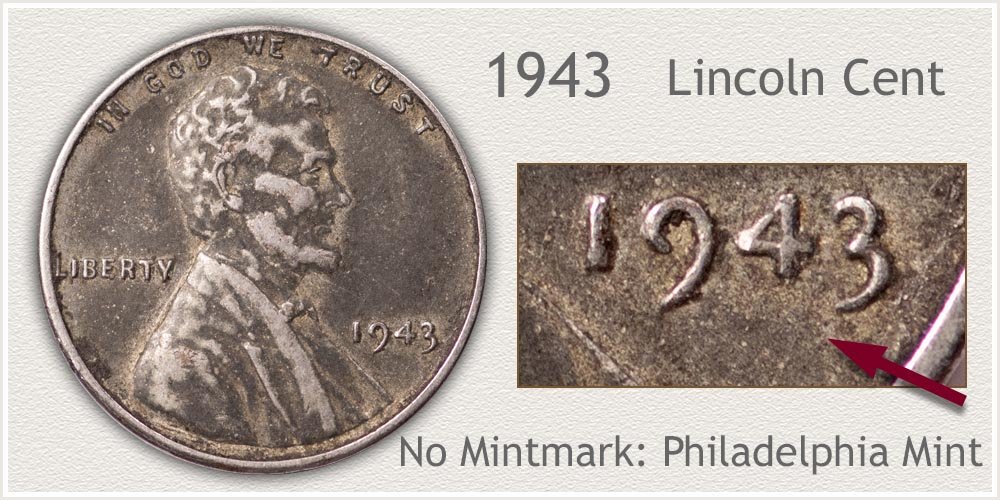
Philadelphia's high mintage of 1943 pennies, (684,628,670) is the 5th highest of any year wheat cent. These coins are on a rarity scale of Abundant. Saving at the time contributes to the supply today.
Deterioration is a concern, rusting of the underlying steel is accelerated once the outer protective zinc is worn and removed. Absence of dark surfaces is a coin above average in preservation.
1943-D Lincoln Penny
"D" Mintmark Under Date: Denver Mint Struck the Coin
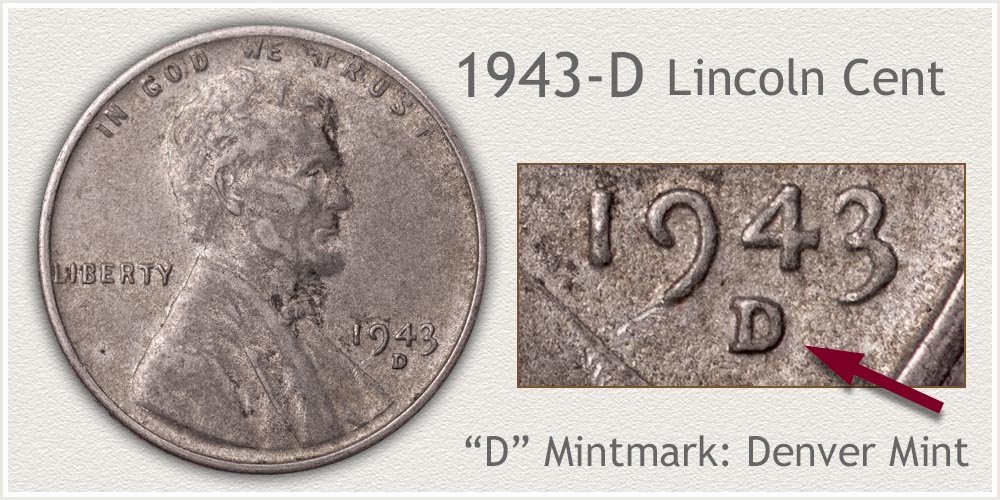
Abundant on a rarity scale. Denver 1943 cents are in demand because of their uniqueness. Very popular with collectors. A light sliver grey is their normal appearance when worn, standing out and easily spotted. Many were pulled from circulation.
Found in a wide range of conditions, desirable examples are absent of both rust from the steel core and discoloration of the zinc.
1943-S Lincoln Penny
"S" Mintmark Under Date: San Francisco Mint Struck the Coin
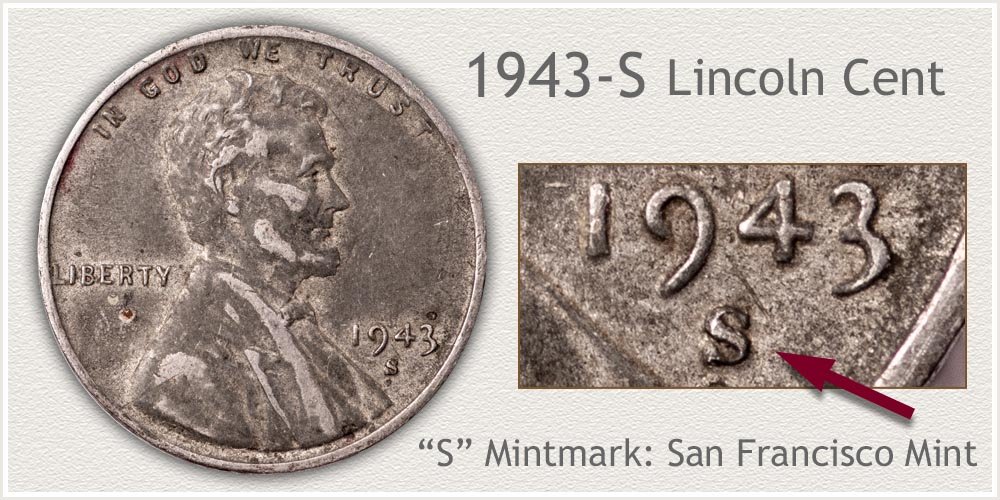
San Francisco struck 191,550,000 zinc coated steel pennies in 1943, 3th highest amount in a single year wheat cent. Representing the only year of this composition, interest remains high. Young collectors seek coins with the least amount of wear. Advanced collections choose from the many available in "like new" condition.
Quality of the surfaces is noted as quickly fading. Desirable is a complete coating of zinc. Many coins removed from circulation have only touches of wear retaining a pleasing appearance. High areas to check are Lincoln's beard and hair.
Step 2: | Judge Condition to Identify Grade
Special Grading Qualities Find 1943 Penny Value
A 1943 penny is unique in the numismatic collectible group of wheat cents. Historic value is high. Technical and aesthetics grading determines value to collectors. A grade defines its state of condition and is used by collectors to help judge its worth.
Handle the coin gently, hold the edges only avoiding touching the surface. Steel alloy is the underlying composition of the coin and reacts to moisture forming rust. Precautions help preserve the future condition of the coin.
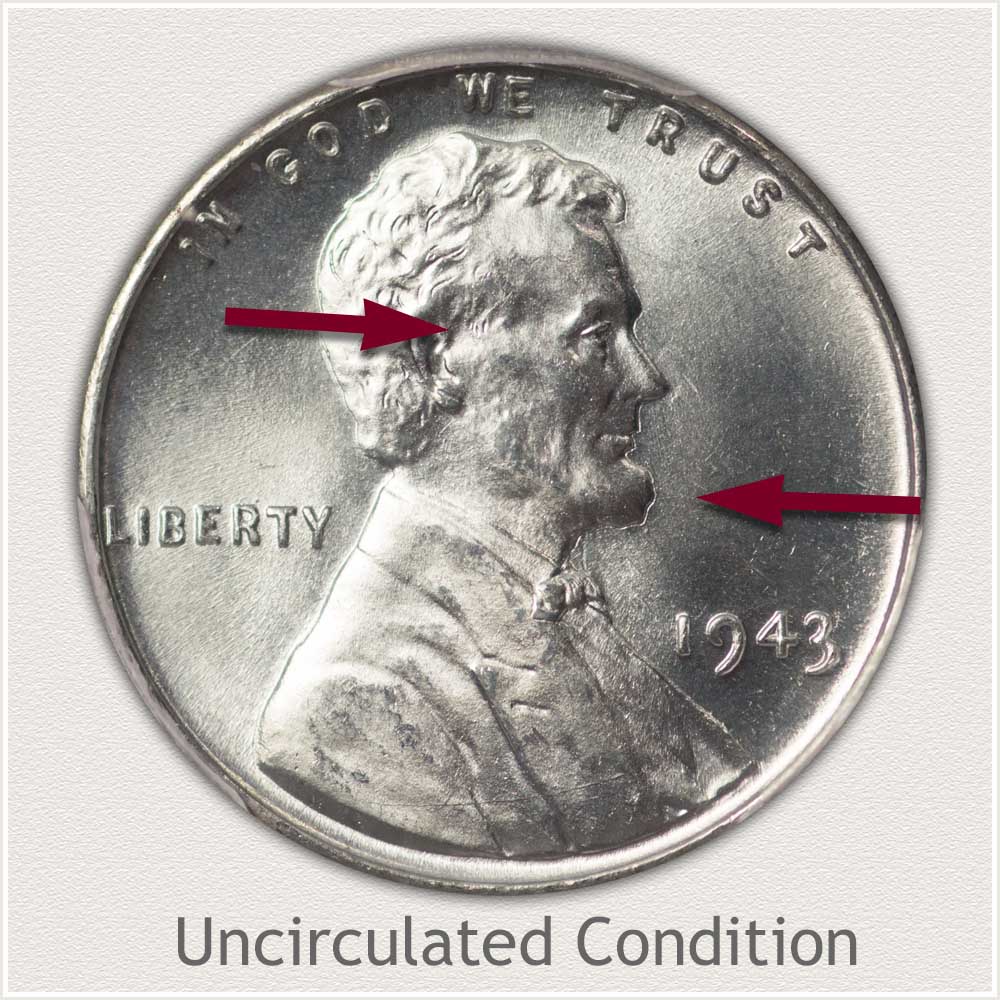
Uncirculated Grade: A very distinctive blue-white luster shines from a mint state - uncirculated 1943 cent. These coins are struck from a zinc coated steel alloy. Luster and its texture remain intact to reach the uncirculated grade.
Zinc, the outer coating, is prone to dulling if disturbed. Handling and circulating through commerce easily start the process of metal removal. Highest areas to judge for complete luster are Lincoln's temple, cheek, and jaw. As you tilt the coin under a light confirm no breaks in shine are evident.
Noticeability absent are small spots due to humidity. Zinc exposed to moisture forms a white soft power, zinc oxide. This example was well preserved over time.
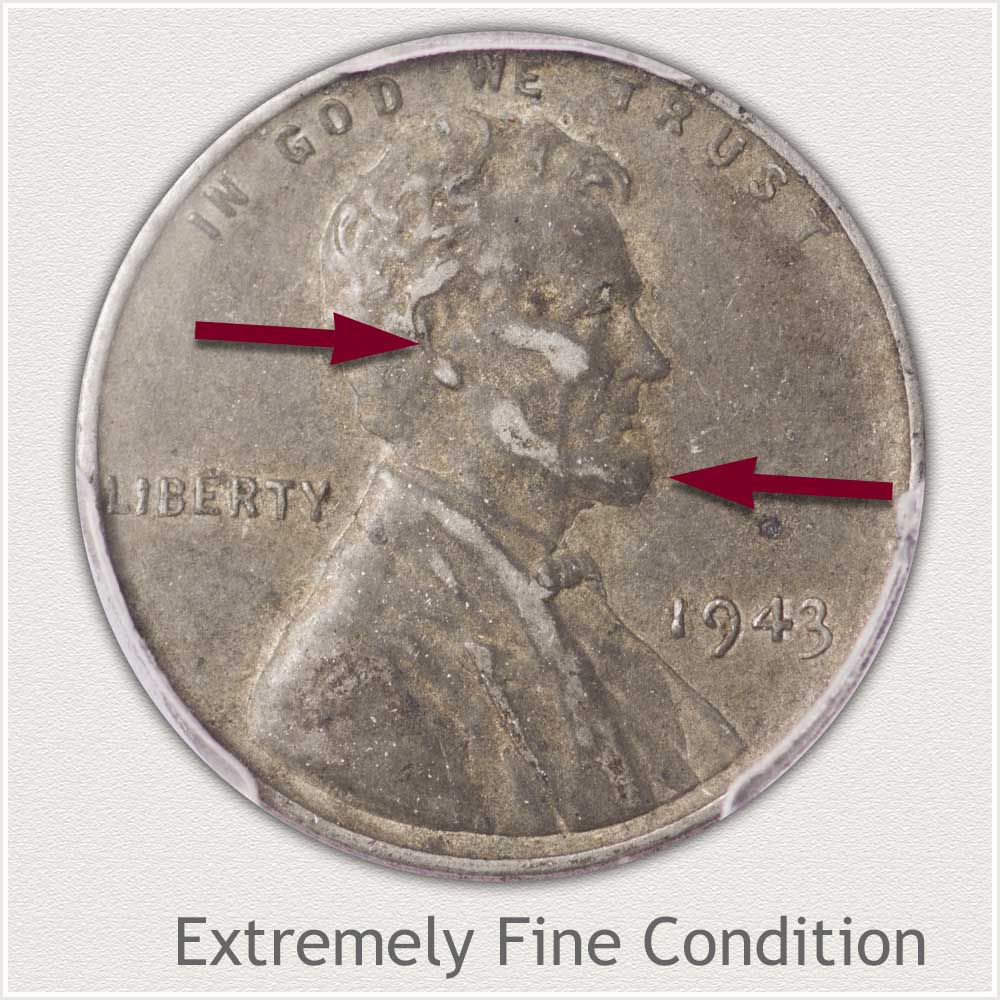
Extremely Fine Grade: A light amount of wear visible to high areas places this coin in the Extremely Fine grade.
Lincoln's portrait shows evidence of wear confined to just high points. Curls of hair are flattened but major waves remain separated. His temple, cheek, and jaw are smooth and flat on the highest ridges. No areas of wear form connections to each other.
A natural blue-grey color is displayed by the fields of the coin, highlighting the legends and devices. Absent is any rust. Circulation wear has removed only small portions of the outer zinc coating. Preservation in a dry location has resulted in a collectible grade 1943 steel penny.
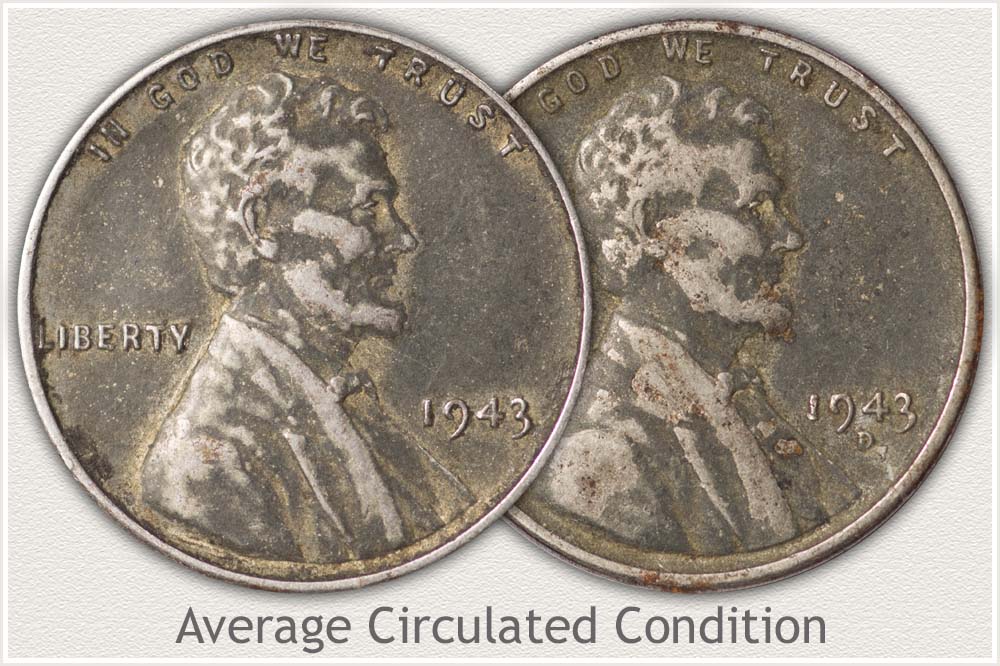
Collectible Grade: Qualities of these unique 1943 pennies involve special considerations in condition less than Extremely Fine grade. Wear has removed enough design and metal from the two examples to grade lower than extremely fine on a technical basis.
The penny on the left is worn throughout the hair, face, and coat of Lincoln. Upper surfaces are clearly flattened and smoothed. Noticeable is the major elements remain separated and none are connected due to wear. The second penny is worn to the point design elements are beginning to connect. A distinct merging of Lincoln's hair and forehead is visible.
Both are in the collectible grading range. One is a strong Fine grade and the slightly lower condition example is a pleasing collectible 1943 penny. Importantly in this condition a strong eye appeal is projected by both coins. Darker tones of grey within the fields highlight lighter tones of the devices.
Video | Grading Lincoln Wheat Pennies
Place higher grade coins in individual holders. Small zip lock bags are a good temporary solution. For higher value coins, Grading Lincoln Wheat Pennies expands on the grading process with video, descriptions, and images.
Step 3: | Special Qualities Enhancing Value
Step 3: Finding Special Qualities of a 1943 Steel Penny
1943 steel cents capture interest of collectors. Their history is directly connected with WWII. A shortage of copper combined with a need to provide coinage to commerce forced the mint to use an alternative alloy. Freeing up tons of copper for the war effort, the now famous steel coated zinc combination was developed. It is the only use in US coinage of this alloy. It did however present a few problems. Immediately the mint recognized the metal was harsh on coining dies, reducing die life.
Secondly, once the new metal composition was released into circulation rust and oxidization was now a new consideration to collectors in judging qualities of these coins.
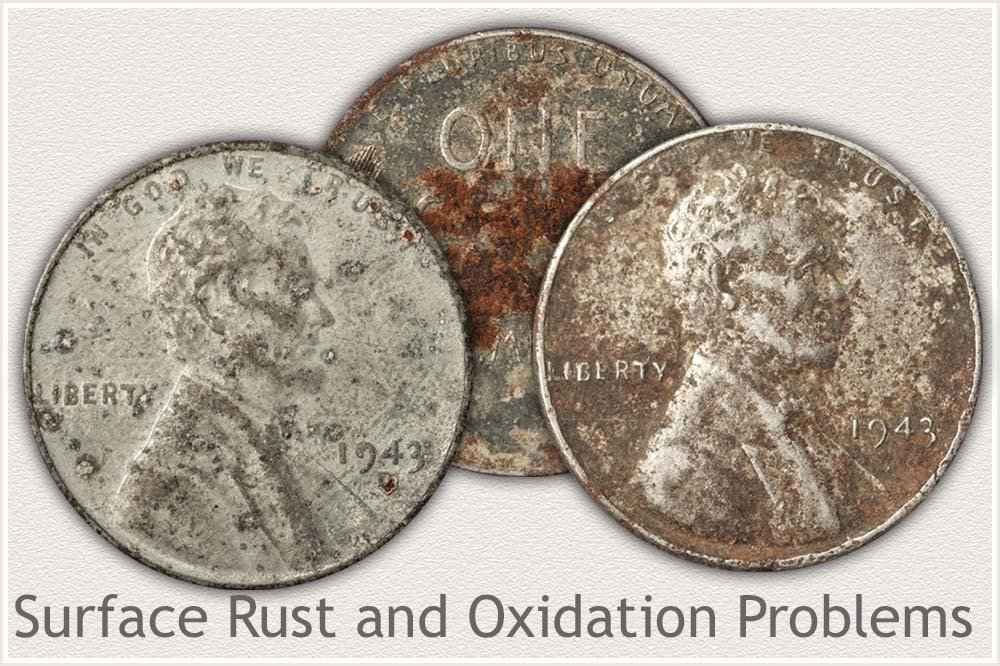
Zinc, the protective coating, when worn, exposed underlying steel. Additionally, zinc develops an oxide forming a white powder coating to the metal. Normal humidity in the air presented a challenge to preserve a 1943 cent. Evidence of both rust and oxidation are visible on the example coins. Values of these steel pennies is greatly reduced by the problems rust creates. Collector preference are coins without rust.
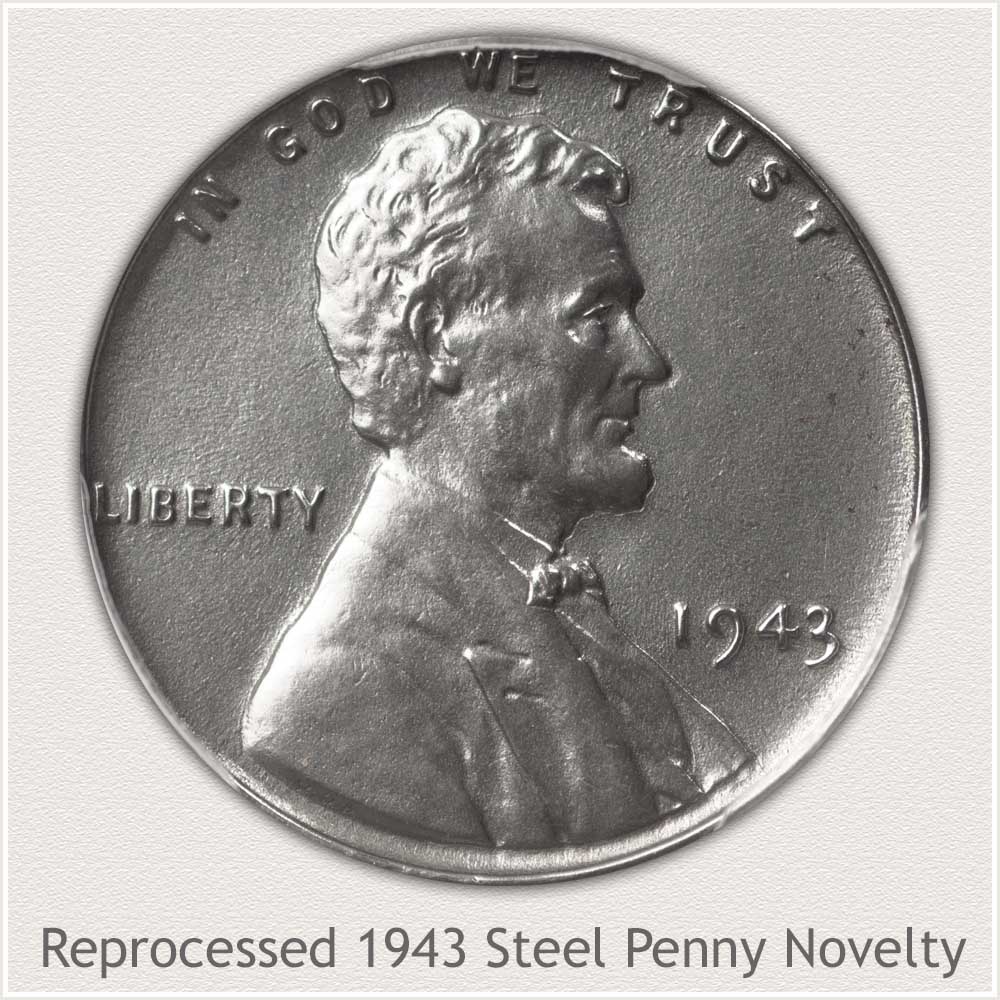
One wide spread market development was the introduction of "Reprocessed" 1943 Steel Pennies. Lightly circulated cents were cleaned and recoated to a brilliant shine by private firms. Surfaces of the coins lack the sparkle of luster only possible by the striking of a coin with dies. Typically sold in sets of three to include Philadelphia, Denver, and San Francisco issues. These are considered novelty items and have no collector value. Originality is the key to value.
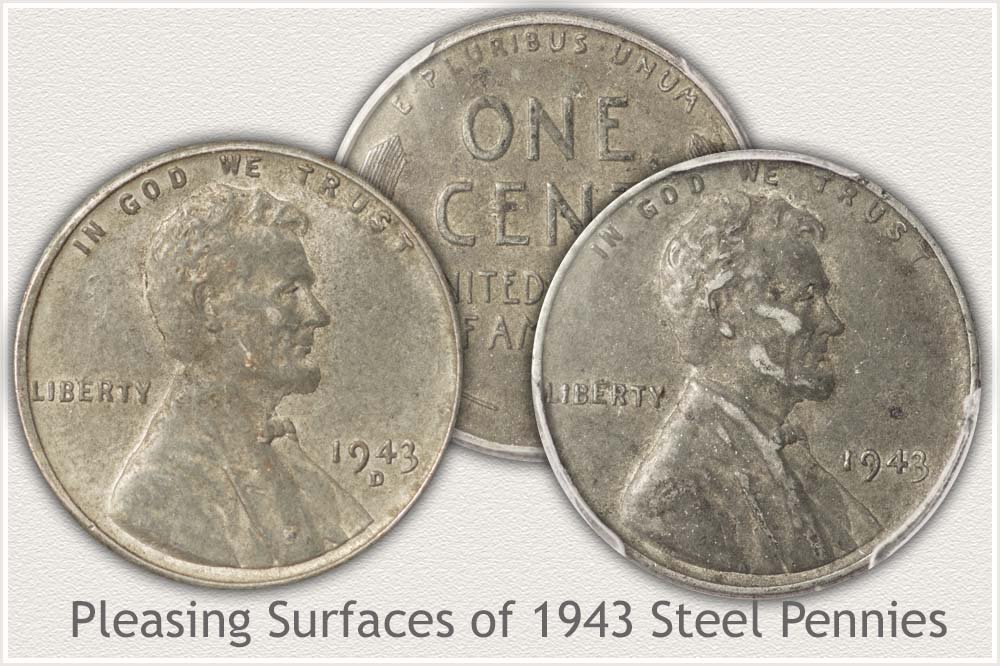
Eye appeal is an important consideration by collectors when choosing a coin to add to their collection. Each of the above are worn 1943 steel cents displaying wear to the surface. Problems are absent from the surfaces, however. No larges nicks distract the eye and rust is not present. Deep grey blue fields are smooth and not pitted. A lighter shade of silver-grey highlights the design. Worn steel pennies with eye appeal are popular with beginning collectors and a fascination to younger collectors.
References
US Mint. 1944 US Mint Annual Report
https://nnp.wustl.edu/library/publisherdetail/51
Federal Trade Commission. Investing in Collectible Coins. https://www.consumer.ftc.gov/articles/0136-investing-collectible-coins
Coin Values | CoinStudy Articles
Coin Value Guide | How to Value a Coin Collection
A step by step method combined with the coin value online guide identifies how to value a coin collection. Discover how much your box of old coins is worth.
Value chart spans the Wheat design years 1909 through 1958 of Lincoln cents. From uncirculated coins collected by advances collectors to worn examples an affordable collection popular with young collectors. Identify date, mint and condition; a wide range of values is found and identified.
Printable sheet to list and inventory your coins.
★ Coin Values Discovery finds 1943 Penny Value and...
US coin value charts covering cents to gold. Identify your coins using the image links. Date | Mintmarks | Condition are described and imaged with each series. Small details necessary to accurately value are described.